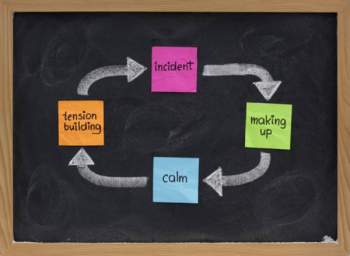
4 States of the ‘Cycle of Violence’ Study

What is the ‘Cycle of Violence’?
The ‘Cycle of Violence’ is a psychological ideology founded by Lenore Walker – a clinical psychologist considered to be amongst the pioneers of psychology with regard studies of domestic violence and abused women.
The Cycle of Violence serves to illustrate the methodology, process, and systematic manifestation of abusive relationships; this ideology not only outlines the events leading up to domestic violence cases, but also the itemization of the gradual unfolding of events resulting in domestic violence.
Upon understanding the Cycle of Violence, Dr. Walker had hoped to spread the results of her studies in order to provide assistance to individuals suffering from abusive relationships and situations; as a result, victims of domestic violence would be given the opportunity to remove themselves from harmful situations, but individuals would be given the tools to notice patterns within abusive situations.
The 4 Stages of the Cycle of Violence Study
Within the Cycle of Violence study, Dr. Walker cites the 4 stages of abuse and domestic violence; these stages range from the inception of domestic violence to the tragic and devastating aftereffects:
‘Tension Building’
The building – or rising - of tension is considered to be the first phase of the Cycle of Violence, which manifests itself through passive aggression, the facilitation of distance on the part of the abuser towards the abused partner, and the establishment of a nervous, tense, and agitated state within the romantic relationship - the ‘Tension’ phase results in a heightened sense of fear and anxiety on the part of the abused partner
‘The Incident’
The enactment of the abusive incident in question is considered to be the second phase of the Cycle of Violence, which is classified as the abusive action or expression manifesting itself; abuse taking place within the ‘incident’ phase can include spousal abuse that is physical, emotional, or sexual in nature - the ‘Incident’ phase results in the establishment of intimidation in order to facilitate the abuse taking place
‘Reconciliation’
The enactment of reconciliation undertaken by both individuals participatory within the abusive relationship is considered to be the third phase of the Cycle of Violence, which involves the abuser expressing remorse for their respective actions; in certain cases, the ‘Reconciliation’ phase may involve the abuser denying the abuse that had taken place; Dr. Walker cites that this denial may result in the proliferation of self-doubt and guilt within the abused partner
‘Calm’
The sense of calm and peace subsequent to the abusive incident is considered to be the fourth phase of the Cycle of Violence, which involves the period following the apology or expressed sense of remorse on the part of the abuser; typically, a sentiment of forgiveness or disregard for the prior abuse is not only implicit, but expected within the ‘Calm’ phase - the danger reported within the ‘Cycle of Violence’ study is primarily evident with regard to the repetitive nature innate within this cycle
Assistance for Victims of Domestic Violence
Upon the review of the Cycle of Violence, if any or all of the stages area applicable to you – or your current situation – through the involvement in current Domestic Violence cases or cases that have occurred in the past – you are encouraged to contact their local authorities or law enforcement department in order to report the details of the offense.
Despite the alarming rate of domestic violence, almost half of domestic violence abuses are not reported; remember - the opportunity to report Domestic Violence offenses in an anonymous fashion is also available to you upon contacting the National Domestic Violence Hotline through their 24-hour telephone number: (800) 799-7233.
NEXT: Is Domestic Violence A Problem For You? Read This.





















